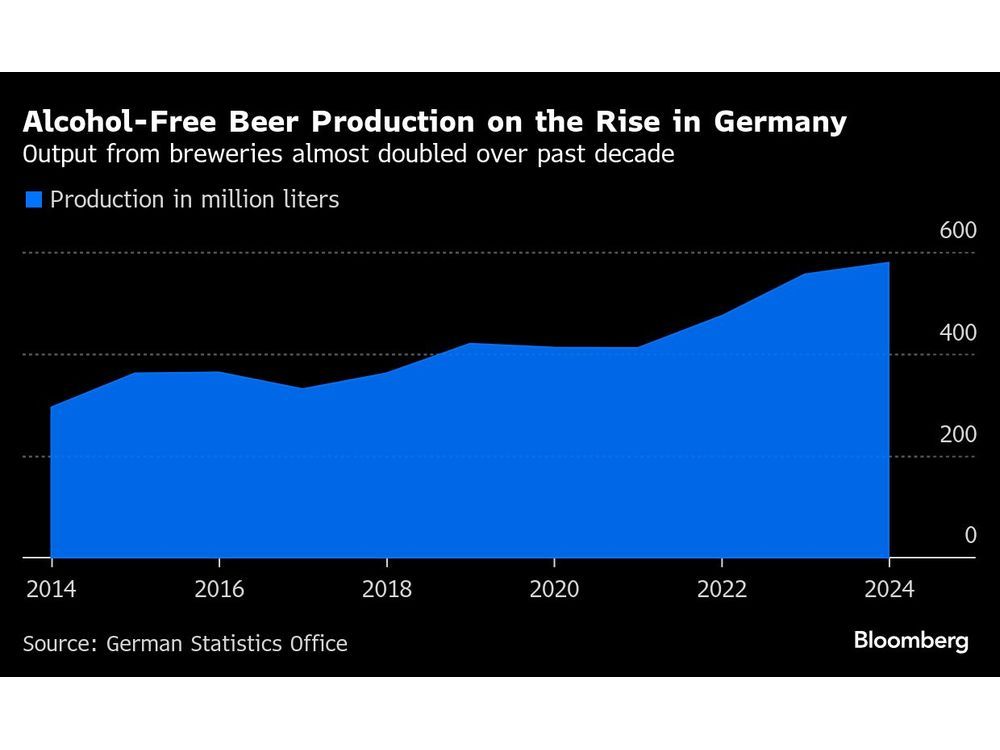Top Stories
German Breweries Face Crisis as Gen Z Shuns Alcohol; 52 Close

UPDATE: German breweries are in crisis mode as rising costs and changing consumer preferences force them to adapt. The historic Lang-Bräu Brewery in Bavaria has announced it will close after failing to manage €12 million ($13.9 million) in necessary upgrades. This closure reflects a troubling trend within the industry as Gen Z shifts away from alcohol consumption.
Over the past year, inflation and soaring energy prices have squeezed profit margins for many German brewers. With fewer young people choosing to drink alcohol, the landscape of beer consumption in Germany is changing dramatically. This shift has prompted a staggering 6.3% decline in beer production in the first half of 2025, marking a record low for the nation known for its rich beer culture.
“Breweries are capable of incredible suffering,” said Richard Hopf, who led the family-owned Lang-Bräu. “But when sales fall and costs keep going up, it leaves little room for long-term considerations.” The average German now drinks only 88 liters of beer per year, down from 126 liters in 2000, highlighting the significant shift in consumer habits.
As young people increasingly view alcohol as a rare indulgence, breweries are scrambling to adapt. More than 800 varieties of alcohol-free beer are now available in Germany, but this has not offset the overall decline in beer sales. “It’s frankly worrying,” stated Holger Eichele, head of Germany’s brewer association. “Even those who’ve run their business for centuries might be forced to give it up now.”
This trend is not confined to Germany. Young consumers across Europe and the United States are reducing their alcohol intake, driven by wellness movements and heightened awareness of health risks. “For my generation, it’s clear that alcohol isn’t good for your body,” said Carla Schüßler, a student in southwestern Germany.
The pressure is mounting on the country’s approximately 1,500 breweries. Between 2023 and 2024, 52 breweries closed, marking the largest decline in three decades. Those that remain are diversifying their offerings, introducing products like mixed beers and sparkling juices to attract health-conscious consumers.
Billboards and advertisements now promote alcohol-free enjoyment—an unprecedented move in a nation famous for its beer festivals, including Oktoberfest. Notably, while the majority of beers sold still contain alcohol, the production of non-alcoholic beer has nearly doubled in the last decade. “Clearly, the growth area is low- or non-alcoholic beer,” admitted Peter Lemm, a spokesperson for Krombacher, one of Germany’s largest breweries.
Developing alcohol-free versions of traditional beers poses challenges. Many smaller breweries cannot afford the necessary equipment, which can cost around €1 million ($1.2 million) to remove alcohol post-fermentation. Instead, they often stop the fermentation early, resulting in sweeter, less authentic flavors that may deter discerning drinkers.
As the market becomes increasingly saturated with alcohol-free options, smaller breweries like Lang-Bräu find themselves in a tight spot. Hopf noted that despite the influx of alternatives, they never ventured into the alcohol-free market, suggesting it may not have made a significant difference.
The brewing industry stands at a crossroads. The evolving tastes of younger consumers are reshaping what it means to enjoy beer in Germany, and many breweries must innovate or face the consequences. As these developments unfold, the future of Germany’s iconic beer culture hangs in the balance.
-

 Politics4 weeks ago
Politics4 weeks agoSecwepemc First Nation Seeks Aboriginal Title Over Kamloops Area
-

 World5 months ago
World5 months agoScientists Unearth Ancient Antarctic Ice to Unlock Climate Secrets
-

 Entertainment5 months ago
Entertainment5 months agoTrump and McCormick to Announce $70 Billion Energy Investments
-

 Science5 months ago
Science5 months agoFour Astronauts Return to Earth After International Space Station Mission
-

 Lifestyle5 months ago
Lifestyle5 months agoTransLink Launches Food Truck Program to Boost Revenue in Vancouver
-

 Technology3 months ago
Technology3 months agoApple Notes Enhances Functionality with Markdown Support in macOS 26
-

 Lifestyle3 months ago
Lifestyle3 months agoManitoba’s Burger Champion Shines Again Amid Dining Innovations
-

 Top Stories2 months ago
Top Stories2 months agoUrgent Update: Fatal Crash on Highway 99 Claims Life of Pitt Meadows Man
-

 Politics4 months ago
Politics4 months agoUkrainian Tennis Star Elina Svitolina Faces Death Threats Online
-

 Sports5 months ago
Sports5 months agoSearch Underway for Missing Hunter Amid Hokkaido Bear Emergency
-

 Politics5 months ago
Politics5 months agoCarney Engages First Nations Leaders at Development Law Summit
-

 Technology5 months ago
Technology5 months agoFrosthaven Launches Early Access on July 31, 2025




















